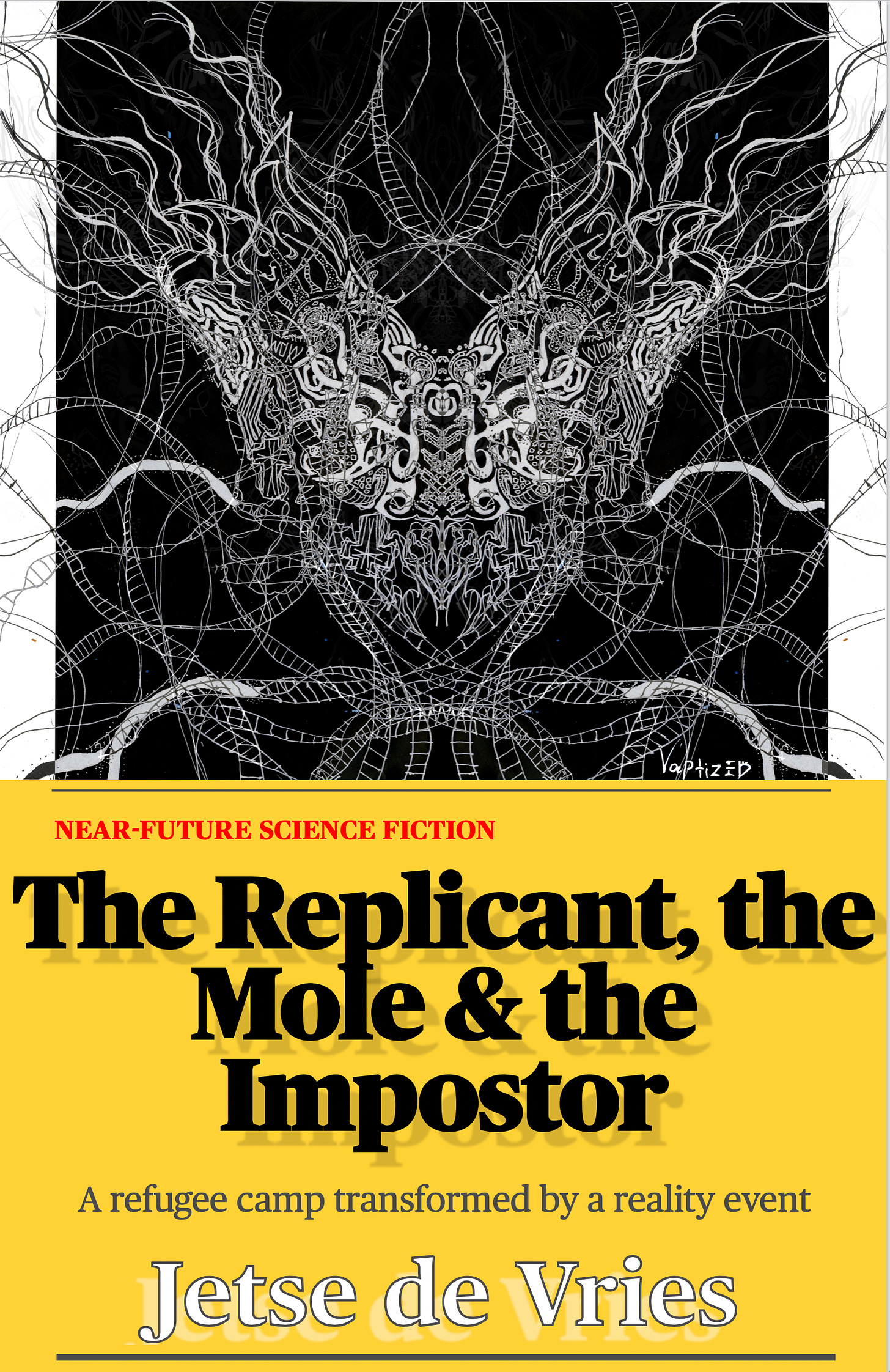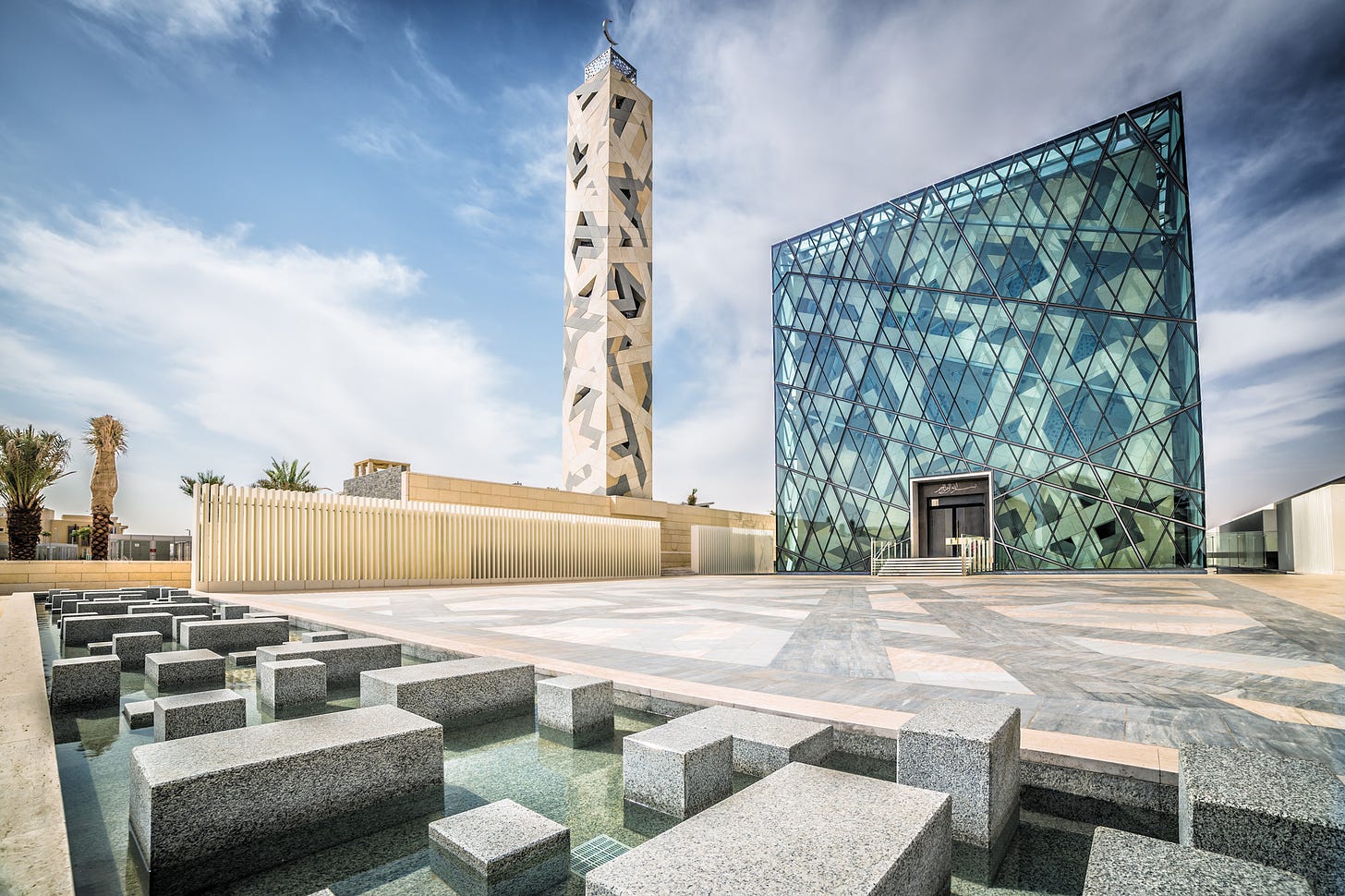The Replicant, the Mole & the Impostor, Part 11
Part 2—the conclusion—of a duology where a reality event held in a refugee camp on a Greek island unfolds in an utterly unexpected manner. There will be 50 parts. Chapter 7: February.

—At the Lab—
Against the usual protocol, and against previous agreements, Manfred Kafka and Léa Truchon have requested a video meeting—already done via AR-Space, which is much closer to actual, in-the-flesh contact—two weeks into February, apart from the usual one at the end of each month.
“Sorry to make a demand on your precious time,” Léa says, “but Manfred and I agree this is of vital importance, and we’ll try to keep it short.”
“Some of you may think it’s all fun and games when we perform our monthly musings about who is the replicant,” Manfred says, “but we should not lose sight of the fact that the whole world—well, almost four billion people—are watching.”
“As all of you are certainly aware,” Léa says, “certain governments, political parties, and special interest groups have been trying to downplay the value of research and the scientific method, attempting to taint specialists.”
“And while the recent COVID-19 pandemic has restored some confidence in science,” Manfred says, “the same forces as before are—once again—trying to erode it to serve their particular political agendas.”
“This is our moment,” Léa says, “where we can show everybody again—almost the whole world—the value of true specialists.”
“We can’t rest on our laurels, we need to prove ourselves,” Manfred says, “and our consensus is clear: Dewi and Omar are our main suspects. So they should show up as the first two on our list.”
“Even if the audience votes for someone else,” Léa says, “eventually we can still demonstrate that we were correct, all along. And I don’t care for the producers of this show, who’ve tried to let us know—in both subtle and very unsubtle ways—that it is of vital importance that this circus runs all the way into May. We have a principle at stake. A principle that’s more important than this—admittedly wildly popular—reality event.”
“So, we hope you consider this very seriously when it gets to the vote in our next monthly session,” Manfred says, “as we think that not only our, but every scientist’s, reputation might be at stake.”
🌞🌝🌚
As the group AR-video shuts down, Manfred and Léa connect over a private channel.
“I hope that what we didn’t really say is clear to the others,” Manfred says, “except one.”
“The next vote should demonstrate that our voting process is untampered with,” Léa says. “Otherwise there truly is a mole amongst us.”
“I think we have a fairly good idea of the most likely candidate,” Manfred says, “but how to prove it?”
“Asking to put our voting process out in the open—if only for the six of us—could be seen as losing face,” Léa says, “with some nasty repercussions if we’re wrong.”
“So we either have to determine if it’s worth forcing the issue,” Manfred says, “or we approach it from the other side.”
“From the other side?” Léa is puzzled. “What do you mean?”
“When we all got our invitations from VanderPol Excel, we assumed they’d gone through a careful selection and vetting process,” Manfred says. “What if it wasn’t quite as, well, thorough as we’d been made to expect?”
“So we need to do background checks on our colleagues?” Léa says. “I can’t imagine Jennie not being on the level. After all, she’s recognized as one of the most brilliant in her field.”
“Then a background check should confirm that,” Manfred says. “Q.E.D.”
“Themba’s your man for Quantum Electro Dynamics,” Léa says, smiling.
“That’s low,” Manfred protests. “You know what I mean.”
“Indeed,” Léa says, all business again, “so let’s do some sleuthing, then.”
—In the Camp—
It’s a dreary February day in the Middle Eastern section of the camp—clammy, cold, and muddy. Yet the people keep working on their neo-homesteads because the sooner they are ready, the sooner they will have shelter from the ravages of winter. How bad this wet cold is depends quite a bit on each individual, and their experiences with the chilliest season.
“The winter’s really bad here,” a refugee says to Piotr as they’re trying to fit one of the avant-garde novo-portals in a wall. “I’ve got a cold, again.”
“It’s still above zero degrees,” Piotr says. “In my country you’d be freezing your ass off.”
“It freezes in Syria, as well,” the refugee says, “but it remains dry. This dampness chills me to the bone.”
This gives Piotr pause, thinking about how the humidity seems to pass through all his layers of clothing. “You have a point,” he says, “so we better finish this quick.”
“Hopefully before the end of the month,” the refugee says. Piotr thinks about the warm residence he’s staying in and agrees.
A bit farther on, Akama, Rahman, Esteban, and Agnetha are assisting a large group of refugees with the foundation of their mosque. The fact that they not only allowed but actually invited Agnetha, the extravagant lesbian is a mark of progress in itself. During the mosque’s design meetings, the Middle Eastern refugees were divided as to how much help they should accept. Obviously they need the reality event candidates to provide them with the needed materials—their fundraisers still raised more money than those of the Middle Eastern refugees themselves, plus they have the contacts to get the required materials quickly—but many of them had second thoughts about how much the candidates should be personally involved.
There is no guidance stating that only Muslims are allowed to build mosques, so non-believers can be enlisted as well. And having the now world-famous reality event participants nearby is good PR in itself, as it helps increase their visibility and, subsequently, their fundraising efforts, and the amount of support they get from the Islamic community worldwide. On the other hand, if one of these participants is such a blatant unbeliever (nobody needed to mention Agnetha by name), then one can foresee a considerable pushback.
The tide against Agnetha’s involvement has turned as many have found out, simply by working with her, how good she is. Her multitasking abilities in AR-space are quickly becoming the stuff of legend (and making her the latest top bet for being the replicant). All the projects she’s been involved in are the ones to be finished the soonest: both efficient and top quality. So using her help—without directly enlisting her—would move the reality of an actual mosque forward. Then some of them would thank her—and her fellow candidates—both heartfelt and profusely, while others could then start to forget she was involved in the first place. And if she actually is the replicant, all the better, because then she’s only a robot playing a modern human—an evil caricature, at that, according to the very conservative amongst them—without a soul. In other words, a tool, not a sinner or a blasphemer.
So, through the combined powers of need, support from the more progressive Muslims—who are probably overrepresented as war, violence and poverty are not the only reasons they left their homelands—practical thinking, and the advantages of showing their best side to the western world, Agnetha is part of the team that’s building the mosque for the Middle Eastern refugees.
Agnetha didn’t need much convincing, either, as by this time, she’s quite eager to demonstrate that while she will fight—vehemently, if necessary—for her freedoms, she will also tolerate other beliefs, cultures, and societies as long as they respect hers as well. Being instrumental in building a mosque in their refugee camp will be a perfect demonstration of mutual respect.
It’s still controversial in certain quarters, though. And when Seneth and his friends approach the site of the new mosque, Esteban immediately drops what he’s doing to go to them. Some of his fellow participants have their doubts about this.
“Do you really need to go to Seneth and his gang, Esteban?” Akama says. “As your roommate, I must say that this starts to look like an unhealthy obsession.”
“I agree,” Piotr says. “Why waste time with those we cannot trust? It’s better to help those who are trustworthy.”
“But that would be the easy way out,” Esteban says, “most of the trustworthy ones already see—and know—that we’re really trying to help them. It’s the ones who are mostly stuck in their ways that we need to convince.”
“I think Piotr is right in this case,” Akama says. “You can’t convince everybody. Some people are a lost cause.”
“I respectfully disagree,” Esteban says. “Wasn’t it Jesus who said that we should try to save every soul?”
“Since when are you Christian?” Akama says.
“I’m not,” Esteban says, “but there are good things in the Bible.” Then he walks toward Seneth as Akama shrugs and Piotr rolls his eyes.
🌝🌞🌚
Author’s note: after being jetlagged in Mexico, now I’m jetlagged in Canada. But not jetlagged enough to prevent me from posting this episode. Welcome to yet another subscriber, and many thanks for reading!






